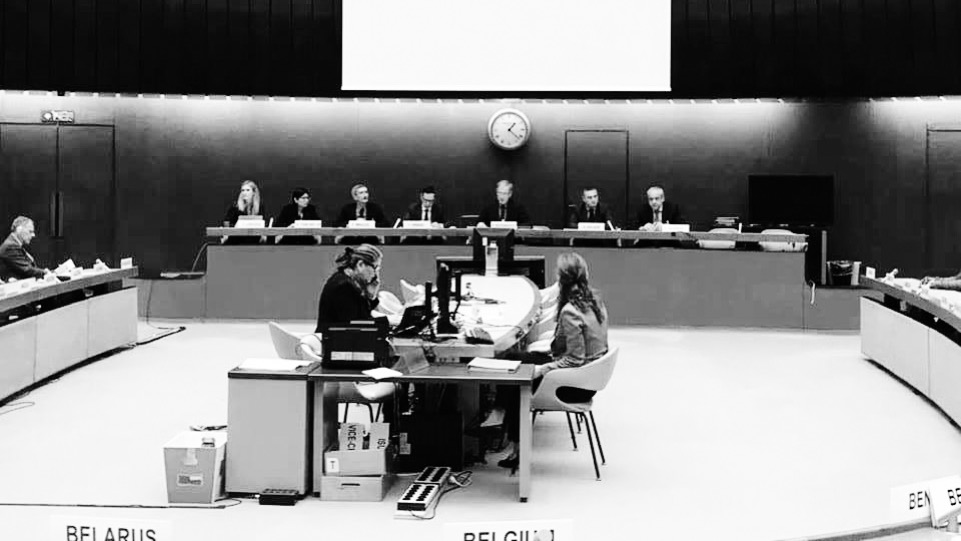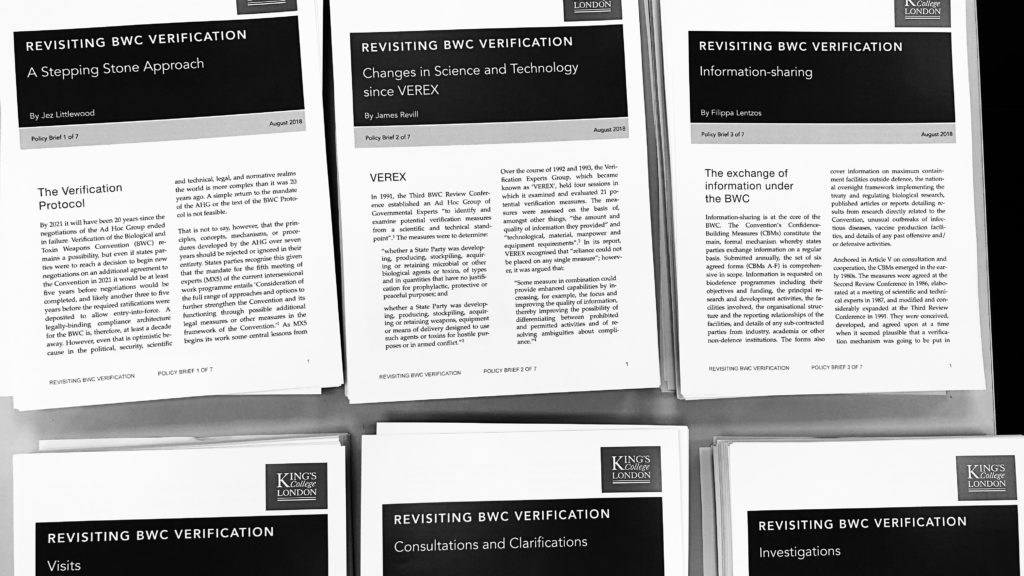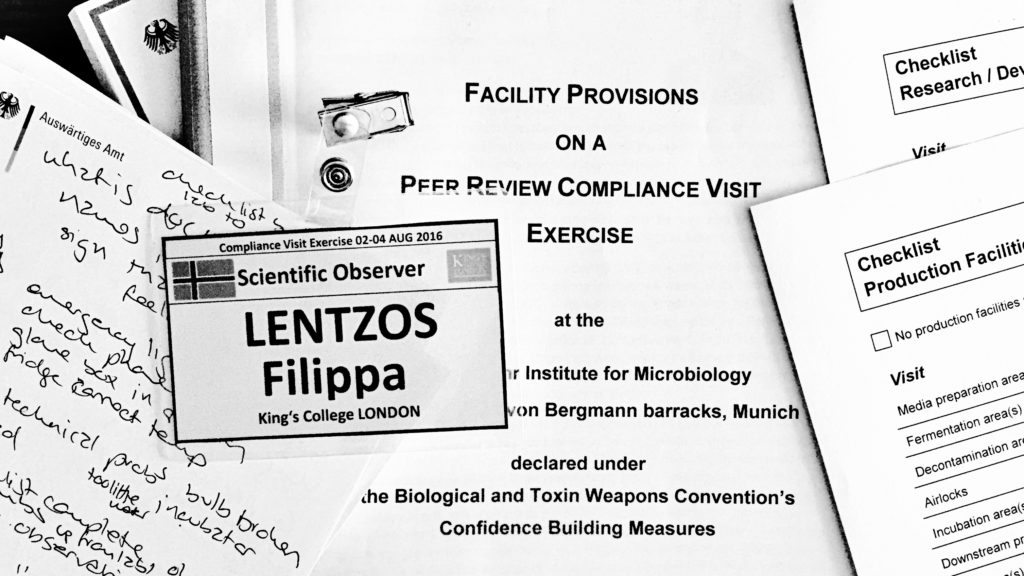I regularly work with ministries of foreign affairs and other government partners, as well as international organisations and national institutes. Below is a list of some of the projects and outputs I have been involved in over the last few years.
Transparency visit: Georgia
2018 project with the German Federal Ministry of Foreign Affairs and the Georgian Ministry of Foreign Affairs
I was invited as an independent expert alongside 20 state party representatives on a transparency visit to the Richard Lugar Center for Public Health Research (Lugar Center) of the National Center for Disease Control and Public Health (NCDC) in Tbilisi, Georgia. Photos
I authored an independent report of the visit, submitted by Georgia as a working paper to the BWC meeting in December 2018. I presented the report to BWC delegations at a side event to the BWC meeting hosted by Germany, alongside presentations by the Head of Lugar Center and the team leader of the visiting experts. The presentations were preceded by introductory remarks by the German, French and Georgian Ambassadors to the UN in Geneva. I also published an article in The Bulletin setting out the political context of the visit and detailing the Russian accusations against the facility. The article was recognised as one of “the most topical, relevant and insightful [Bulletin] columns of 2018”, and went on to become the central focus a Washington Examiner article on Russia’s more general efforts to sow discord and division in the West.

Revisiting BWC Verification
2018 project with the Norwegian Ministry of Foreign Affairs
I was commissioned by the Norwegian Ministry of Foreign Affairs to produce a series of policy briefs arguing for an incremental, inclusive, practical and forward-looking approach to verification. Working with Jez Littlewood and Jamie Revill, we developed a ‘stepping stone’ approach that moves away from the earlier dichotomous framing of verification as either a single legally binding model or an incremental adoption of procedures and mechanisms that enhance implementation of the BWC. Instead, the stepping stone approach builds on the historical realities of the BWC and proposals that have emerged since 2001 to strengthen the Convention.
- Policy Brief 1 A stepping stone approach
- Policy Brief 2 Changes in science and technology since VEREX
- Policy Brief 3 Information-sharing
- Policy Brief 4 Visits
- Policy Brief 5 Consultations and clarifications
- Policy Brief 6 Investigations
- Policy Brief 7 Peaceful cooperation
The policy brief series was launched on 16 August 2018 at a side event to the first of the present intersessional cycle’s meetings of experts on institutional strengthening of the Convention (MX5). Presentations of the briefs were given by the authors, and these were followed by an interactive discussion with the audience. The launch was introduced and chaired by Hana R. Cervenka, First Secretary at the Permanent Mission of Norway in Geneva.

Transparency visit: Germany
2016 project with the German Federal Ministries of Defence and of Foreign Affairs
I was invited as an independent expert alongside 20 state party representatives on a transparency visit to Germany’s main military biodefence facility to evaluate its compliance with BWC obligations.
I described my observations of the two-day exercise in a Briefing Paper published by the EU Non-Proliferation Consortium in November 2016. Germany submitted a Working Paper with my reflections on the exercise to the Eighth Review Conference of the BWC, and I briefed state party delegations on the exercise during an 8 November 2016 BWC side event hosted by Germany.

3D BIO: Declare, Document & Demonstrate
2015 project with Chatham House and SIPRI
This was a conceptual project with Chatham House to envision a bottom-up, state-led approach to strengthening BWC compliance assessment. Our approach complements, reinforces and strengthens the permanent prohibition of biological weapons enshrined in the BWC through a process of Declaration, Documentation and Demonstration (3D-BIO). A briefing paper was published by the EU Non-Proliferation Consortium in April 2015 outlining the approach and a small workshop was convened in Geneva in August 2015 to discuss the project with select stakeholders and to map a plan to take the initiative forward.
Dual Use in Biology and Biomedicine
2015 project with the Nuffield Council on Bioethics
I was commissioned by the Nuffield Council on Bioethics to write a Background Paper on dual use in biology and biomedicine to inform the Council’s discussions about possible future work on this topic.
Confidence & Compliance with the BWC
2014 project with the Foreign & Commonwealth Office
I was commissioned by the UK Foreign & Commonwealth Office to lead a project to shape the way the CBM discussion was framed in the run up to the 2016 BWC Review Conference, and to provide an indication of where points of contention and agreement could be expected to lie.
The project carried out a series of informal consultations with Geneva-based missions. Key diplomats, national experts, staff from international organisations and academics were also brought together to discuss confidence and compliance with the BWC at a one-day workshop in advance of the week-long expert meeting of the 171 states party to the BWC. Co-organised with the Geneva Centre for Security Policy (GCSP), the meeting focused on three principal issues: (1) the extent to which the BWC is verifiable; (2) whether confidence building measures actually build confidence on the ground; (3) what a legally-binding mechanism might look like today.
A report from the workshop was launched on 1 December 2014 on the opening day of the week-long December meeting of the BWC. Dr Matt Rowland, the UK Ambassador to the Conference on Disarmament, gave some opening remarks, and Dr Gustav Lindstrom (GCSP) gave an overview of the workshop report. I chaired the event.
An Information Paper introducing the project and providing a summary of the workshop was submitted by the United Kingdom to the BWC Meeting of States Parties in December 2014.
One of the ways in which the CBMs build confidence and demonstrate compliance is their documentation of national oversight arrangements for dual use research of concern and of national biodefence R&D. The rapid pace of advances in the life sciences mean they must continually be evaluated and assessed to ensure appropriate oversight is in place. One area of life science research that has gained a great deal of attention recently is ‘gain-of-function’ research, which makes certain viruses more transmissible or deadly. Using gain-of-function research as an example, the launch of the workshop report also featured a seminar on gain-of-function and saw presentations from Prof Simon Wain-Hobson (Institut Pasteur) and Prof Marc Lipsitch (Harvard University). A podcast from the seminar is available. Tweets are at #BWCMX #BWCMSP14 #DURC2014
An article titled Preventing a man-made pandemic elaborating on gain-of-function, bioweapons and confidence was published in The Bulletin following the December seminar. An earlier article on the project The BWC: Compliance, Transparency & Confidence was published in Disarmament Times, the quarterly publication of the Non-Governmental Organization (NGO) Committee on Disarmament, Peace & Security on the work happening in and around the United Nations, its Member States, and non-governmental organizations.

Hard to Prove: Monitoring BWC Compliance
2013 project with King’s Policy Institute
Verification and compliance monitoring remain highly contentious for Biological Weapons Convention (BWC) states, and have been kept firmly off the negotiating table for over a decade. A small group of states tried to change this in 2012. In a Working Paper, Australia, Canada, Japan, New Zealand and Switzerland called for an initial conceptual discussion “to promote common understanding of what constitutes compliance with the BWC and effective action to enhance assurance of compliance.” Responding to that call, this project, funded by the King’s Policy Institute, aimed to support and shape the multilateral policy discussion on strengthening biological disarmament.
The project’s main objective was to frame the way in which delegations and their capitals think of BWC verification and compliance monitoring, expanding the traditional and narrow “artefact-centric” approach to regulating unconventional weapons to one that views dual use life science technologies as a knowledge-based risk that must be managed, not a material- and equipment-based threat that can be eliminated.
The project produced a substantive policy brief – Hard to Prove: Compliance with the Biological Weapons Convention – for diplomats, experts and other BWC delegation members setting out a civil society perspective on what constitutes compliance with the BWC and how states can better demonstrate their compliance with the treaty.
The policy brief was launched at a side event on the opening day of the 2013 BWC meeting of experts in Geneva. The UK Ambassador to the Conference on Disarmament chaired the seminar. I introduced the policy brief, and my King’s colleagues and co-investigators on the project, Dr Susan Martin and Professor Wyn Bowen, also gave presentations.
The policy brief and side event were referred back to a number of times by national delegations in their working session on national implementation and compliance later in the week.
For instance, Germany said: “A number of delegations shared their thoughts on various questions related to compliance in the BWC context, and we heard additional views during Monday’s side event organised by King’s College London. This event in our view highlighted in particular the need to take into account the diverse group of stakeholders and to also take into consideration approaches other than the traditional top-down approaches.”
Switzerland said: “We welcome the engagement of civil society on this issue. Particularly, King’s College’s policy brief on compliance contains very valuable ideas and recommendations that should be taken forward.”
Australia’s presentation included a post-script about the side event that picked up on the policy brief’s central idea of trimodal regulation. Australia’s reference to the policy brief prompted an unprecedented NGO intervention by myself in the formal session of the meeting to elaborate further on the concept.
Utilizing CBM Data in Practice
2011 project with the Norwegian Ministry of Foreign Affairs
I was commissioned by the Norwegian Ministry of Foreign Affairs to carry out a research project investigating how the Confidence Building Measures are utilized in practice by Biological Weapons Convention member states.
A Working Paper providing quantitative data on the number of states submitting and accessing CBMs, as well as qualitative data on how states actually use the CBMs once they access them, was submitted by Norway, Switzerland and New Zealand to the Seventh Review Conference of the BWC in December 2011. The Working Paper also outlined a series of recommendations on how States Parties can best utilize completed CBM returns.
Options and Proposals to Revise the BWC CBMs
2009-10 project with the Swiss, Norwegian and German Ministries of Foreign Affairs, and the Geneva Forum
A small number of interested governments and civil society actors got together on the sidelines of a Biological Weapons Convention meeting in 2008 to discuss strategies for how to usefully prepare for Seventh Review Conference of the treaty in 2011 and the comprehensive review expected of the CBM mechanism. Some of the key priorities identified were to develop a dialogue on how best to revise the current forms, to obtain as many perspectives as possible on this, and to prepare a set of recommendations. It was felt that this should be a multilateral endeavour and that it would be helpful to convene a meeting of experts outside of the intersessional process specifically for this purpose. That became the basis for a series of three workshops on options and proposals to revise the CBMs in 2009-10, jointly hosted by my team at the LSE, the Geneva Forum and Switzerland, Norway and Germany.
Drawing on representatives from governments, international organisations, civil society and academia, these workshops brought together a range of experts to address key questions on: (1) the objectives of the CBM mechanism and the extent to which these have been achieved in practice; (2) the CBMs in relation to other compliance assessment mechanisms; (3) the format and content of the existing CBM forms, and (4) the effectiveness of the CBM collation and submission process. Throughout these workshops, the aim was to find solutions with the potential to increase both the quantity and the quality of CBM submissions.
A report of the workshop series – Preparing for a Comprehensive Review of the CBM Mechanism at the Seventh BWC Review Conference – was commissioned by the Swiss Ministry of Foreign Affairs and was authored by myself and R. Alexander Hamilton. The report was launched at a BWC side event on 25 August 2010 at the Palais des Nations with remarks from diplomats from the Norwegian, Swiss and German delegations and myself. We convened a further side event about the project on 6 December 2010, again with remarks from diplomats from the Norwegian, Swiss and German delegations and myself.
A Working Paper outlining a set of recommendations to update the current CBM reporting forms was submitted by Germany, Norway and Switzerland to the Seventh Review Conference of the BWC in December 2011.
This project was recognised by, amongst others, the Chilean Ambassador in his opening statement to the BWC Review Conference on 6 December 2011: “Contamos con valiosas propuestas sintetizadas en el compendio elaborado for Filippa Lentzos y Alexander Hamilton. El aporte de Alemania, Noruega y Suiza, después de dos años de un trabajo inclusivio, require nuestra atención.”
Biodefence Programmes
2008 project with the Swiss Ministry of Foreign Affairs
I was commissioned by the Swiss Ministry of Foreign Affairs to lead a research project on the information exchange that builds confidence between BWC member states. The project developed fictitious Confidence Building Measures (CBM) returns for small, medium and large biodefence programmes drawn together on the basis of actual returns. These ‘mock’ CBMs were used as a neutral but concrete basis for moderated discussions in small groups of national experts. Three focus groups were conducted in all; two of these were with Western Group experts, the third was with NAM experts representing seven different States Parties. The groups each contained between 5-10 experts with a mix of background (arms control and non-proliferation, defence, health, security, life sciences).
A Working Paper introducing the project was submitted by Switzerland to the BWC Meeting of Experts in August 2008 and a Working Paper outlining the key findings of the project was submitted by Switzerland to the BWC Meeting of States Parties in December 2008. The project report – Preparing the Ground for the CBM Content Debate – was launched at a BWC side event on 2 December 2008 at the Palais des Nations with remarks by the Swiss disarmament Ambassador, the Head of the BWC Implementation Support Unit, and myself.
BWC CBM National Data Collection Processes
2007 project with the Swiss Federal Department of Defence
I was commissioned by the Swiss Federal Department of Defence to lead a research project on national CBM data collection processes in Biological Weapons Convention member states. The study sampled 10 countries that have consistently submitted returns since the CBM mechanism was agreed in 1986. The sample was selected on the basis of representation from Eastern Group, the Group of the Non-Aligned Movement (NAM) and the Western Group.
A Working Paper outlining the key findings of the project was submitted by Switzerland to the BWC Meeting of States Parties in December 2007. The report National Data Collection Processes for CBM Submissions was launched at a BWC side event sponsored by the Geneva Forum on 12 December 2007 at the Palais des Nations with remarks by the Swiss disarmament Ambassador, the Head of the BWC Implementation Support Unit, and myself.